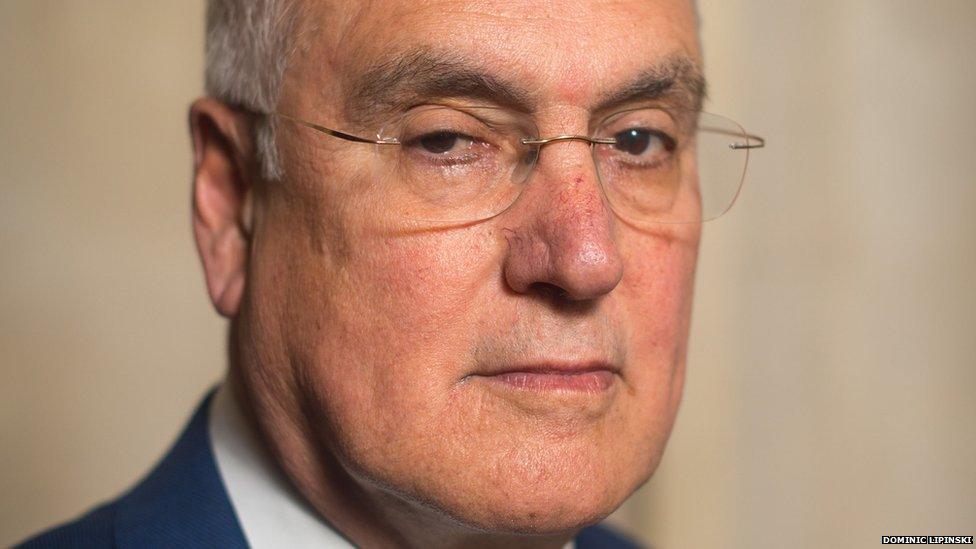School results don't justify academy trust pay, says Ofsted
- Published

Sir Michael Wilshaw said too much was being spent by academy chains on consultants
Top executives at some of England's biggest academy chains are paid huge salaries while pupils are left to get poor results, Ofsted says.
Chief Inspector Sir Michael Wilshaw highlighted serious weaknesses at seven multi-academy trusts in a hard-hitting letter to the education secretary.
He said the trusts were sitting on millions of pounds that should be used to raise standards.
A Conservative party source described the comments as "partial and skewed".
'It is surprising and disappointing to hear Sir Michael attack the academies programme," said a Conservative spokesman.
"His partial and skewed picture is no reflection of the great success of the multi-academy trust model as a whole, which is transforming England's schools and creating the conditions for educational excellence across the country."
The government is pushing for more schools to become academies - and Prime Minister David Cameron has said he would like to make "local authorities running schools a thing of the past".
But in a letter to Nicky Morgan, Sir Michael, a former academy head teacher, said problems at these multi-academy trusts often replicated those of the worst local councils, and were leading to poor results for too many pupils, particularly disadvantaged ones.
'Large cash reserves'
"Given these worrying findings about the performance of disadvantaged pupils and the lack of leadership capacity and strategic oversight by trustees, salary levels for the chief executives of some of these MATs do not appear to be commensurate with the level of performance of their trusts or constituent academies," wrote Sir Michael.
"The average pay of the chief executives in these seven trusts is higher than the prime minister's salary, with one chief executive's salary reaching £225,000.
"This poor use of public money is compounded by some trusts holding very large cash reserves that are not being spent on raising standards.
"For example, at the end of August 2015, these seven trusts had total cash in the bank of £111m.
"Furthermore, some of these trusts are spending money on expensive consultants or advisers to compensate for deficits in leadership. Put together, these seven trusts spent at least £8.5m on education consultancy in 2014-15 alone."
'Problems worsening'
Shadow education secretary Lucy Powell said: "Ofsted has identified a number of very serious concerns within these academy chains.
"The lack of oversight, the lack of capacity within the governance structures and failure to deliver improvements are all issues we have been raising for months.
"As the government continues, without evidence, with its agenda to turn all schools into academies and no system of local oversight to spot and challenge underperformance early, these problems will only get worse, impacting on standards."
Across the seven multi-academy trusts, inspectors found:
Poor progress and attainment
Not enough being done to improve behaviour or attendance
Insufficient scrutiny of teaching quality and its impact on pupils' progress
Trusts not overseeing all their academies well
A lack of urgency to tackle weak leadership
Insufficient challenge from governors.
The seven multi-academy trusts are: School Partnership Trust Academies, E-Act, AET, The Education Fellowship, Wakefield City Academies, CfBT Multi-Academy Trust, Collaborative Academies Trust and Oasis Learning Multi-Academy Trust. The run several hundreds schools in England between them.
Roy Perry, chairman of the Local Government Association's children and young people board, said: "Councils are education improvement partners and not a barrier to change.
"Only 15% of the largest academy chains perform above the national average in terms of progress made by pupils, compared with 44% of councils, while more than 80% of maintained schools are rated as "good" or "outstanding" by Ofsted.
"It's vital that we concentrate on the quality of education and a school's ability to do the very best for all children, rather than on the legal status of a school."
Earlier this week the government signalled that it would further reduce the financial link between local authorities and schools.
A proposed national funding formula for schools, which would be introduced next year, would see budgets going straight to schools, removing local authorities from being a channel for funding.
- Published7 March 2016
